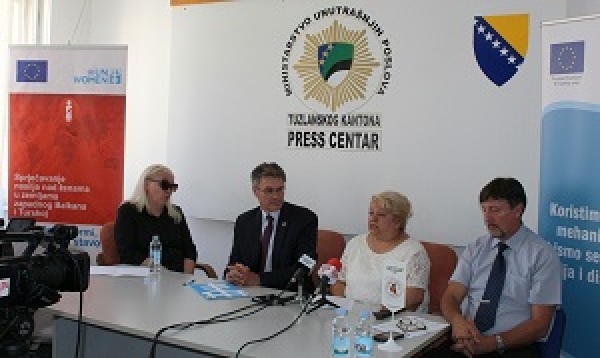Women from vulnerable and minority groups in Tuzla, Prnjavor and Visoko will benefit from the new project that was presented today in Tuzla.
A project “Let’s use available mechanisms in order to protect ourselves from violence and discrimination” was presented by the Association of Roma Women “Bolja buducnost” who are partners in the European Union and UN Women Regional Programme “Implementing Norms, Changing Minds". The project aims at improving access to services for women from marginalized and vulnerable groups.
Indira Bajramovic, President of the Association Bolja buducnost, underlined that domestic violence is one of the biggest challenges of the BiH society which has long left the private sphere and is now out in the public. She emphasized the fact that marginalized communities, such as Roma, are faced with a higher risk when it comes to violence against women “Insufficient and inadequate information on available protection mechanisms from domestic violence and discrimination are a serious issue for so called “hard to reach” women, which causes lack of awareness and support for these groups of women when they experience violence or discrimination,” said Bajramovic.
The project will aim at building capacities of local institutions and increasing trust among key actors, empowering women to use services, through awareness raising campaigns, trainings and peer workshops.
UN Women Representative in BiH David Saunders underscored that the recent research done by UN Women has shown that women who belong to marginalized, minoritized groups of population in BiH are often faced with intersecting inequalities which often fail to be detected by service providers. “As part of the UN Women and the European Union regional action, we are working with partners from civil society organizations to close the gaps for women belonging to marginalized groups. UN Women invites local governments and service providers to work together to reach out to marginalized groups and hear directly from them how best to support them in exercising their rights,” said Saunders.
The project funded by the European Union in the amount of 117,000 BAM was designed according to the recommendations and strategic goals anchored in CEDAW and the Istanbul Convention, as well as the Framework strategy for the implementation of the Istanbul Convention in BiH. Activities will be implemented in partnership with associations „Romska djevojka-Romani ćej“ from Prnjavor and Youth Roma initiative „Budi mi Prijatelj.”

